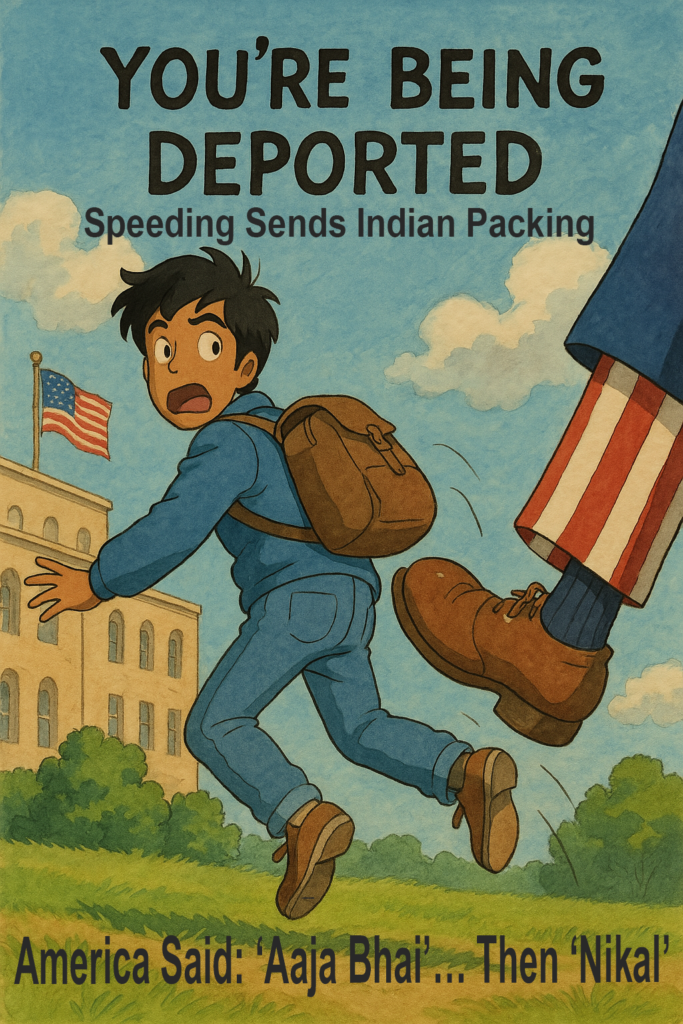Physical Address
18 C Ibbani Harohalli Village
Yelahanka Bengaluru 560064
Physical Address
18 C Ibbani Harohalli Village
Yelahanka Bengaluru 560064

April 08, 2025 – Washington, D.C.
A growing number of Indian international students studying in the United States are finding themselves caught in a wave of visa revocations, forcing them to leave the country or face deportation. What began as a crackdown on campus activism has now expanded to include students with minor legal infractions, leaving many stunned and scrambling to understand their options.
Recent reports indicate that U.S. authorities have shifted their focus beyond political activity, targeting students for offenses as small as traffic violations or petty theft. Dozens of Indian students have received notices from their universities in the past week, citing past incidents like lane shifting, drunk driving, and even shoplifting as grounds for visa cancellation. “Why am I being punished again?” one student, identified only as Ravi, told the outlet, echoing the confusion and frustration felt by many.
The numbers tell a stark story. In the 2023-24 academic year, over 331,000 Indian students were enrolled in U.S. universities, making them the largest group of international students in the country, per the latest Open Doors report. But that figure dropped to 204,058 in 2024—a 13% decline—due to tightening immigration policies and economic pressures, according to Indian government data. Now, this latest wave of deportations threatens to shrink those numbers even further.
For students like Ravi, the stakes are personal. “These are things I’ve already dealt with—paid fines, faced the consequences,” he said. “Now it’s coming back to haunt me years later.” Immigration attorneys note that such minor offenses, while serious in the U.S., are often overlooked for American students but are being wielded as a tool to revoke F-1 student visas for internationals. “It’s a double standard,” said Ravi Lothumalla of US Admissions, a consultancy aiding international students. “Offenses like drinking and driving or shoplifting are common among college kids here, but for foreign students, it’s a one-way ticket out.”
The policy shift follows a broader crackdown that began earlier this year, when hundreds of international students, including Indians, were asked to “self-deport” over alleged campus activism. Emails from the U.S. Department of State cited social media posts or protest involvement as reasons for visa revocation, a move that sparked outrage among students and legal experts. Now, the net has widened. A leaked memo attributed to Secretary of State Marco Rubio reportedly mandates social media screenings and reviews of criminal records for both current students and new visa applicants, leaving little room for appeal.
The human toll is palpable. Students describe sleepless nights and last-minute flights, some abandoning pets or belongings in their rush to comply. Ranjani Srinivasan, an Indian Ph.D. candidate at Columbia University, made headlines last month when she fled to Canada after her visa was revoked for alleged pro-Palestinian activism. “It’s a dystopian nightmare,” she told Hindustan Times after her escape. “Even low-level speech can upend your life.”
Universities, meanwhile, are issuing warnings. Brown University recently advised international students to avoid travel during spring break, citing unpredictable visa cancellations. “I left everything behind for this,” one anonymous Indian student at Cornell told USA Today, her voice breaking. “This country couldn’t provide me with basic humanity.”
The Indian government has responded cautiously, urging students to comply with U.S. laws. “Visa matters are a sovereign function,” said Randhir Jaiswal, spokesperson for India’s External Affairs Ministry, last month. “We expect our nationals abroad to follow local regulations, just as we expect foreigners in India to do the same.” Consulates, he added, stand ready to assist those in distress—though many students, like Srinivasan, say they’ve been too overwhelmed to seek help.
Critics argue the policy reflects a broader anti-immigrant sentiment under the current administration. “It’s a privilege to study here, not a right,” Silicon Valley CEO Rishi Kumar posted on X, defending the deportations. But for students who’ve invested years and lakhs of rupees into their American education, it feels like a betrayal. “I just wanted a degree and a chance,” said Priya, a 22-year-old engineering student from Hyderabad, who now faces a revoked visa over a speeding ticket from 2023. “Now I’m going home with nothing.”
As the U.S. heads into an uncertain political season, the fate of its international students hangs in the balance. For the Indian diaspora—long a pillar of the U.S. academic and tech scenes—the message is clear: even the smallest misstep can cost you everything.